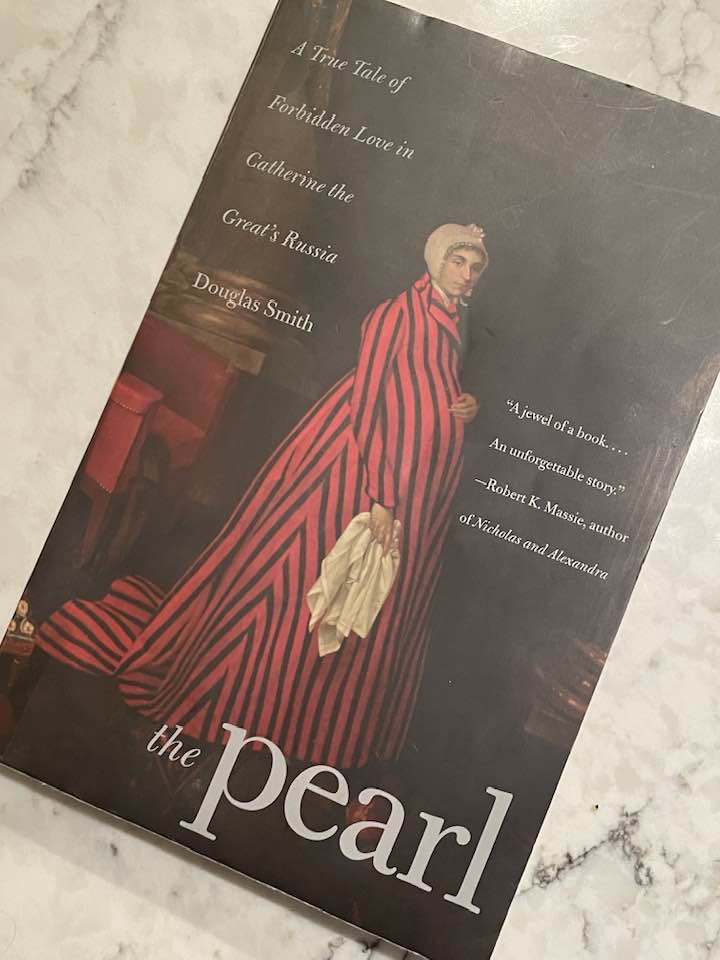MARCH 10, 2025 – (Cont.) Nicholas was single-minded in his pursuit of architectural grandeur and lavish performances inside his multiple theaters—at his estates of Kuskovo, Ostrakino, and Markovo, outside Moscow, his dacha at Champêtre near St. Petersburg, and his most ambitious project, the Palace of the Arts in Moscow. For the Palace, he acquired the plans for the 15 largest theaters in Europe and instructed his architects to design a theater that would top them all—as well as the Coliseum in Rome and the theater in Herculaneum. (The Palace of the Arts was never built.)
To train his serf actors, singers, and instrumentalists Nicholas spared no expense and retained the very best of European instruction. His troupe performed for the greatest of the great, including Catherine the Great, who expressed special appreciation for the productions.
If the story of Nicholas and Praskovia is one of outstanding operatic and theatrical achievement, it is also the story of suffering, intrigue, extreme piety, charity, and tragedy. Nicholas experienced frequent ill-health, and even before her fatal illness a few months before she would’ve turned 35 (believed to be infection related to childbirth), Praskovia had several near-death brushes with the grim reaper. Although a corps of doctors was at Nicholas’s beck and call, treatments were medieval. No matter what the malady, it seemed that the favored prescription was a combination of Spanish fly powder, purgatives, baths in warm mare’s milk, and the ol’ standby of the age—bloodletting by leeches. In the end, the good bad doctors couldn’t save The Pearl, despite prayerful appeals to heaven.
Nicholas never recovered from the loss. Her untimely death heightened his feelings of guilt for having hidden for so long the truth of his “serf” wife, and the fumbled attempts to accredit her lineage with false nobility. In this regard, the book provides considerable insight into the chasm between serf and master; the unnatural but unbridgeable divide between the small caste of extreme privilege and the enormous caste without freedom. As one reads of this gross disparity, even with knowledge of Emancipation on February 19, 1861, one is reminded of what lies ahead—eventual revolution.
After Praskovia’s death, Nicholas went on an alms-giving binge—and kept on giving until his death six years later in 1809. He also gave enormous sums to the church. It is thought that he was motivated in part by a need for penance, but he had also been inspired by Praskovia’s own generosity. Of all the sums that Nicholas had given Praskovia over the years, she kept or spent very little of it, but instead gave freely to charity.
This charitable theme did not extend to Nicolas’s nephews, however. Kyrill and Peter, sons of his sister, were classic ne’er-do-wells; inveterate gamblers with no concern for anything except their own debauchery. Disowned by their father, the sons were forever begging Nicholas for hand-outs. He refused. They ultimately realized they’d have to wait until Nicholas died when they would inherit his limitless wealth. They were scandalized, however, upon learning that Nicholas had married—a serf, no less—and that this serf, Praskovia, had produced a new, “replacement” heir, Dmitry.
Nicholas knew that Dmitry, born in 1803, was in danger from his unsavory older cousins. The Count took extraordinary measures to ensure his son’s safety. Kyrill and Peter eventually burned themselves out and blessed the world by their departures from it. Dmitry, meanwhile, raised by Praskovia’s most trusted friend, Tatiana, carried on his parents’ musical legacy. He had perfect pitch, a fine tenor voice, and an appreciation for choral music. At the Sheremetev Fountain House (far more than an ordinary “house”) in St. Petersburg, he led a return of the family’s 90-voice choir, which won favor not only with members of the royal family but with famous composers of the day, including Glinka, Cui, and Balakirev. After hearing the choir, Franz Liszt and Hector Berlioz each dedicated compositions to it. Dmitry also inherited his parents’ deep religiosity and emulated their altruism. His sons Sergei and Alexander and grandsons Peter and Nicholas would likewise carry on the family’s musical tradition, pursuing serious musical careers.
The Pearl is so rich, it deserves a second reading, which is a typical reaction I experience upon finishing a great book. It reminds me of the dilemma that follows every satisfactory trip to some beautiful part of the world or country: make a return trip to the wonderland just discovered or plot a course to some new and exciting place?
However I resolve that dilemma in the latest instance, I will long remember The Pearl and her people.
Subscribe to this blog and receive notifications of new posts by email.
© 2025 by Eric Nilsson

1 Comment
Thanks for the review!